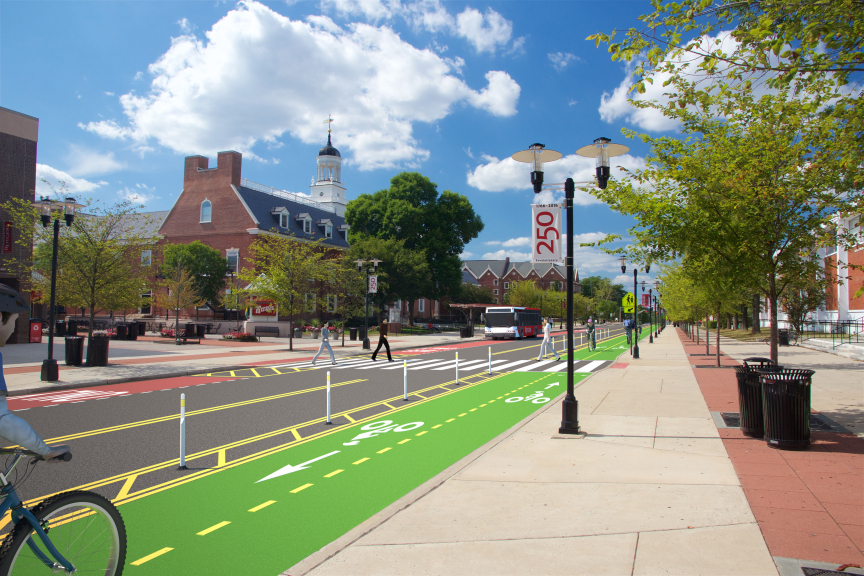Changes Coming to Rutgers' New Brunswick Campus to Improve Traffic Flow, Student Experience
New bike and bus lanes on College Avenue part of broader redevelopment initiative with city of New Brunswick
Rutgers and the city of New Brunswick are taking the next steps in a transformative redevelopment plan by beginning work on dedicated bike and bus lanes along College Avenue that will improve traffic flow, enhance pedestrian safety and create a more attractive campus environment for students.

“Making College Avenue safer, more beautiful and easier to navigate is one more way that we are working to improve the student experience here at Rutgers,” said University President Robert Barchi.
The new plan is part of the College Avenue Redevelopment Initiative that included construction of the residential Honors College, the Rutgers Academic Building, a three-building complex of student apartments, as well as a 25,000-square-foot public green space, The Yard, that serves as a focal point for students, faculty and staff and the surrounding Rutgers community. The Yard includes a boardwalk, large outdoor video screen and restaurants.
Fifty New Brunswick Parking Authority meters, between Huntington and Hamilton Streets, were covered with bags last weekend and will be taken down, eliminating parking along much of College Avenue. Over the next few weeks, work will begin in that area to add a bike lane on one side of the road and a bus-only lane along the other side, which will allow buses to move easily down College Avenue.
Permanent fencing also will be installed between Scott Hall and Ford Hall on College Avenue with gaps at crosswalks. Additionally, a high-intensity signal will allow pedestrians to cross more safely. The projects are slated for completion during the spring semester.
“These exciting improvements compliment New Brunswick’s ongoing Complete Streets policy, focusing on efficient and safe road design for pedestrians, cyclists and motorists,” said New Brunswick Mayor Jim Cahill. “It has been a pleasure to work with Rutgers on this exciting project that will enhance the safety of all users of College Avenue.”
Rutgers and New Brunswick officials say the pending improvements will help traffic flow, eliminate congestion and prevent delays for students trying to get across campus. Students have indicated that they would use bikes more often to get around but have been concerned about congestion and safety issues.
“These improvements mark another step in implementing the university’s physical master plan to achieve the goals of our strategic plan,” said Antonio Calcado, executive vice president for strategic planning and operations at Rutgers.
To compensate for the lost parking spaces along College Avenue, 20 metered spaces will now be available for all-day parking in lot 26, behind the Rutgers Student Center on College Avenue. The remaining metered parking will be located at Alexander Johnston Hall at the corner of College Avenue and Somerset Street and will be available for public use after 6 p.m. weekdays and on the weekends.
“Rutgers University’s plan for the improvement of the College Avenue traffic corridor is another example of its commitment to the well-being of our shared community,” Cahill said.
Rutgers and the city of New Brunswick will continue to work together to make certain that students and visitors are informed about the parking and traffic changes as the plans get underway to complete the transformation of College Avenue.
“Taking this project from the planning stages to a reality is the result of a cooperative and committed effort between senior leadership at the university and New Brunswick Mayor Jim Cahill,” Barchi said. “Tremendous things can happen when the university and city work together.”